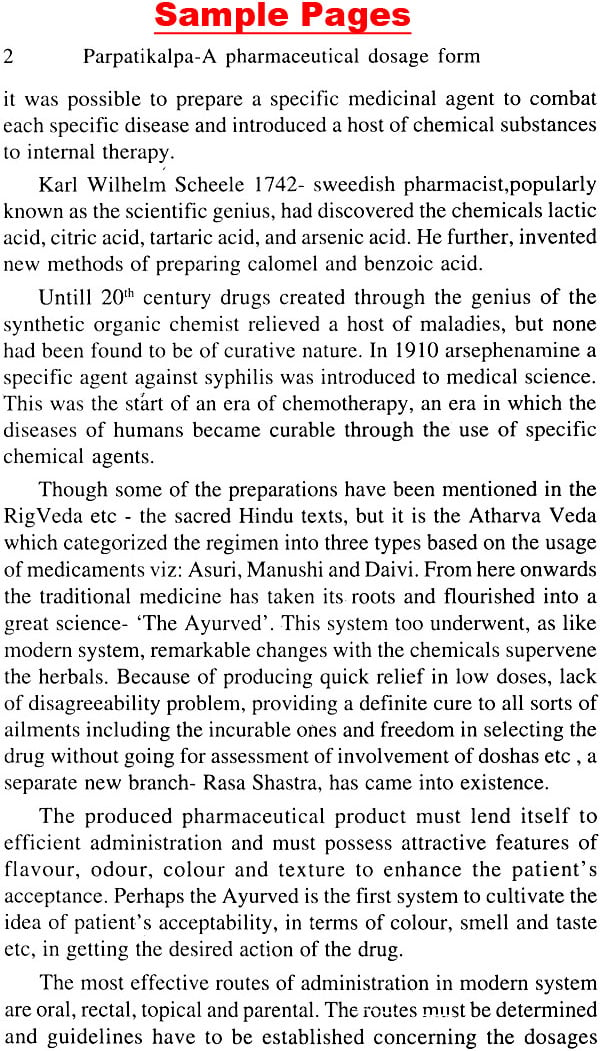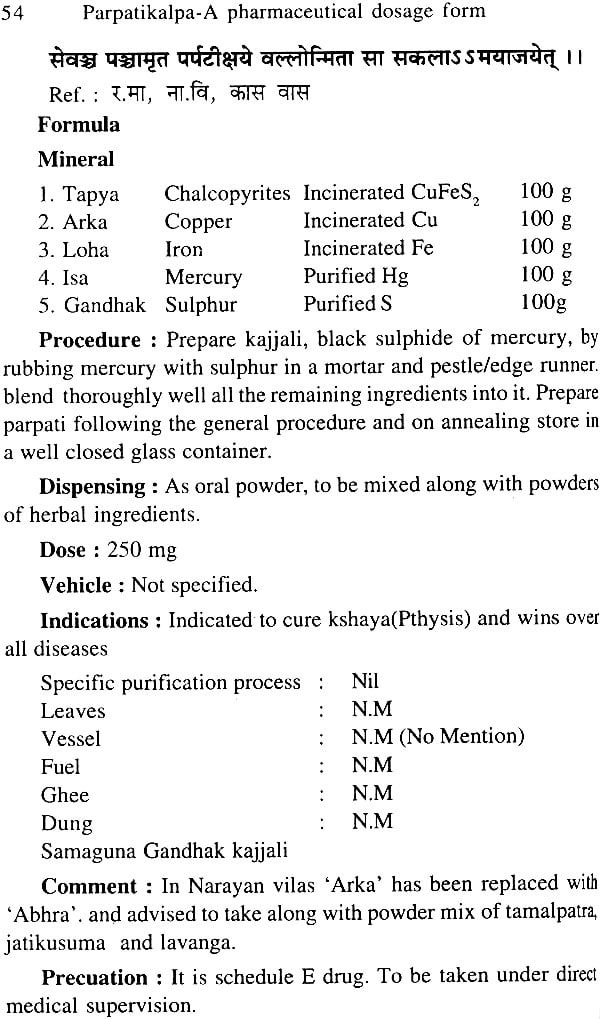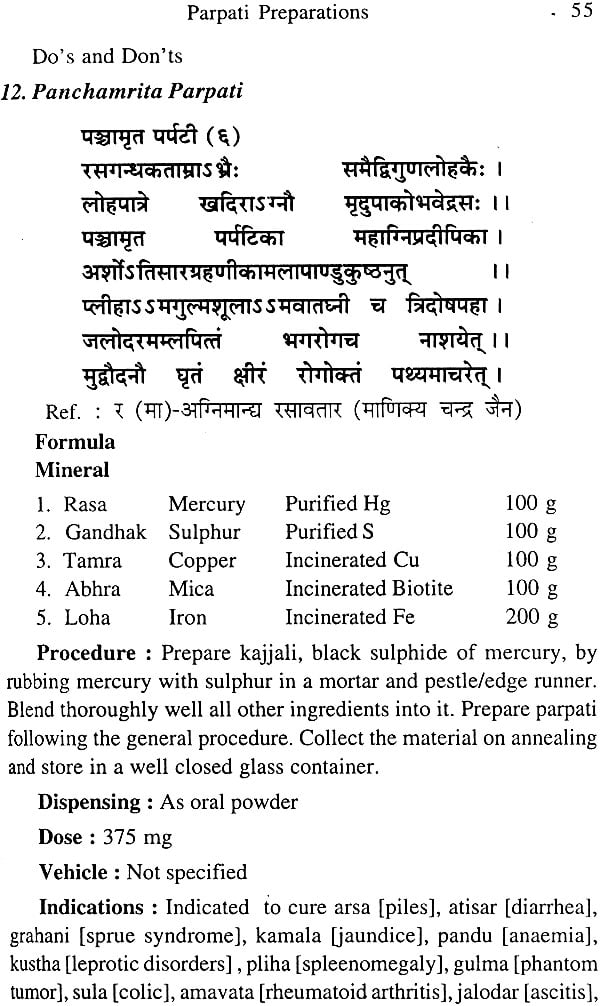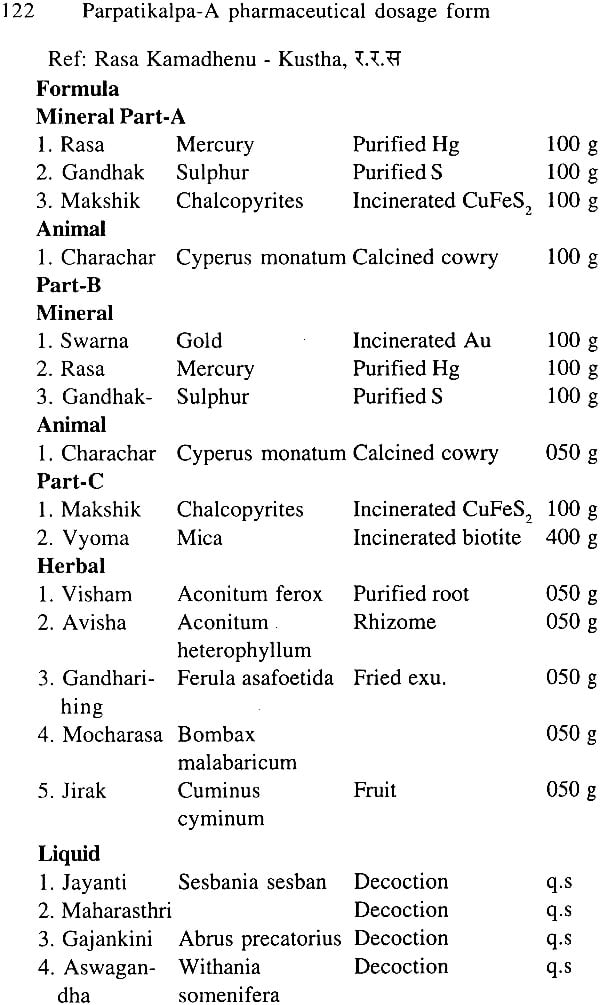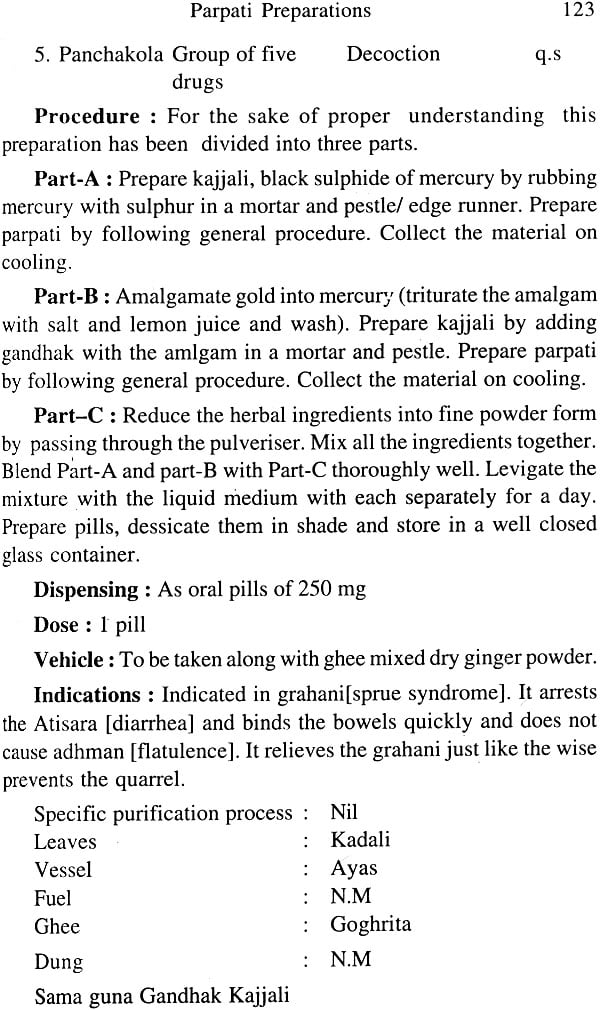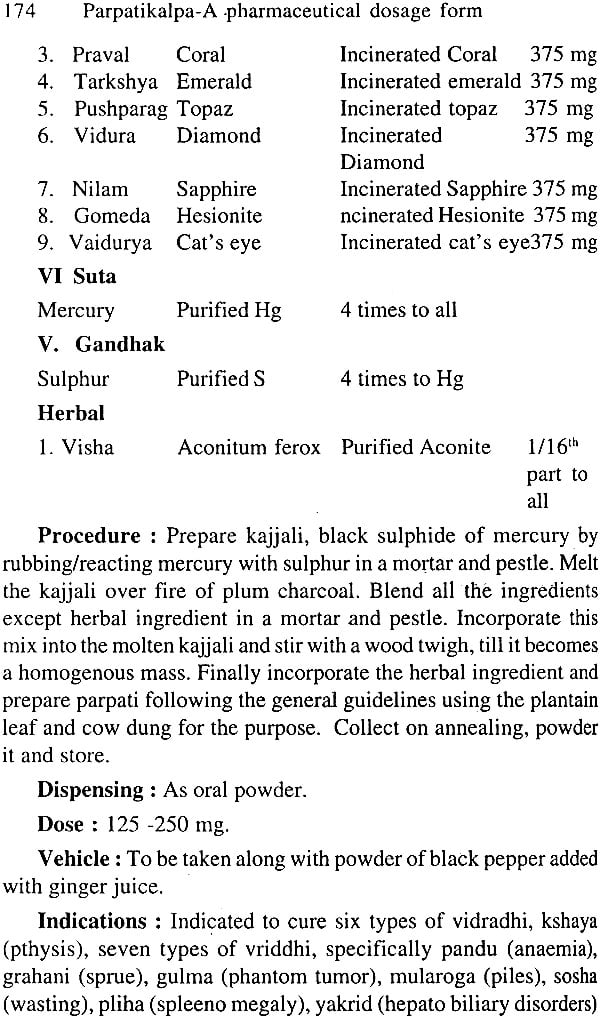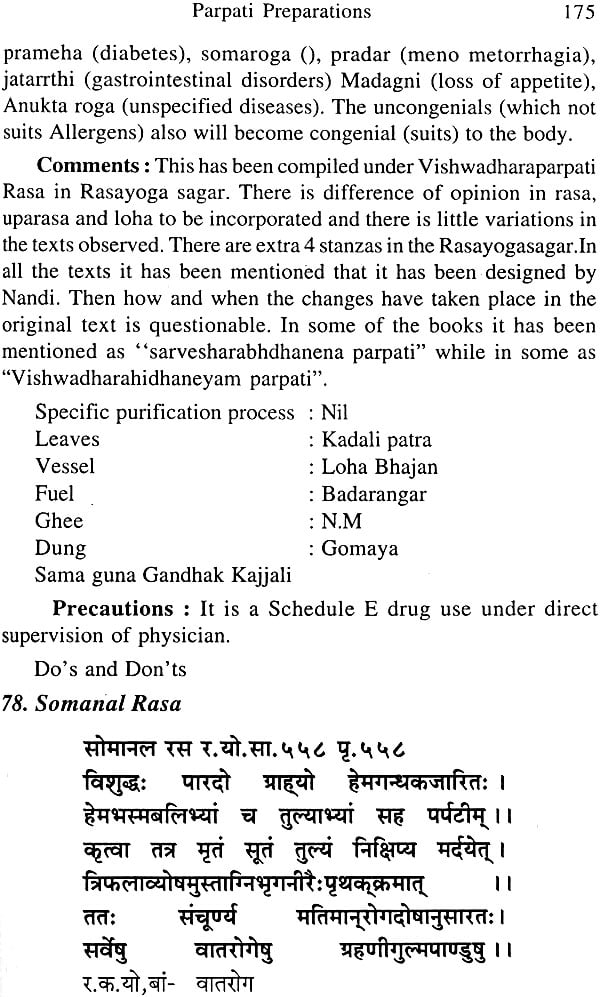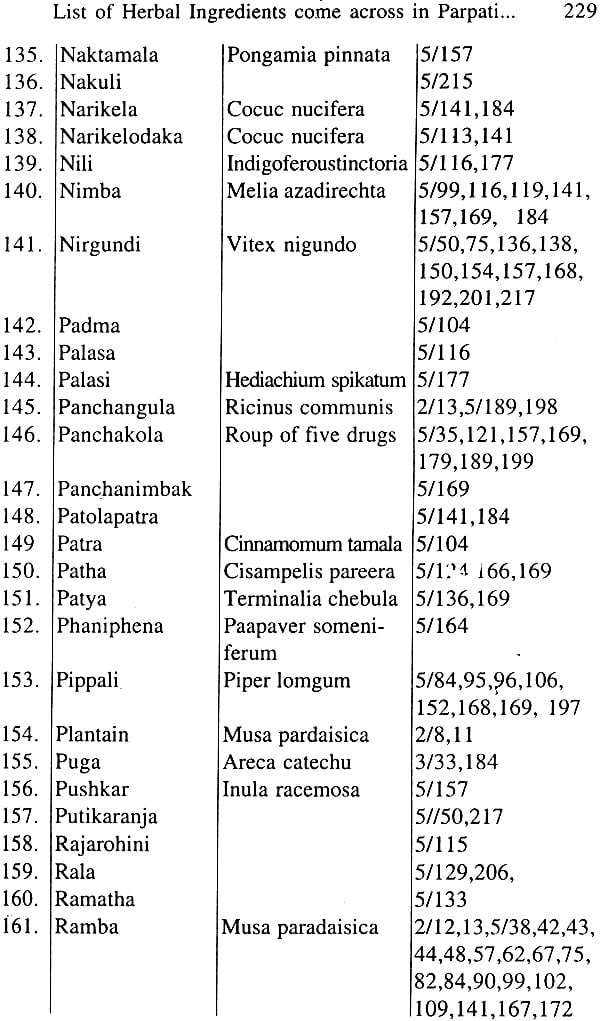
Parpati Kalpa: A Pharmaceutical Dosage Form
Book Specification
| Item Code: | NAK285 |
| Author: | Dr. Parimi Suresh and Prof. Lt. Dhannapuneni Vinaya Kumari |
| Publisher: | Chaukhambha Publications |
| Language: | Sanskrit Text With English Translation |
| Edition: | 2016 |
| ISBN: | 9789381608760 |
| Pages: | 272 |
| Cover: | Hardcover |
| Other Details | 9.0 inch X 6.0 inch |
| Weight | 370 gm |
Book Description
The art of healing is descended from ancient man to present day society after taking so many remarkable revolutionary as well as evolutionary changes. This healing art, mainly developed from the empirical experiences and keen observations and embodies the thus accrued knowledge over thousands of year in the form of medical treatises, indigenous to India- The Ayurved. Ayurved withstood the test of the time not only because of its origin but also because of its quality of adoptability. Rasa Shashtra is a newly upsurge branch later become a part and parcel of the science.
The Rasa Shastra is the branch which uses the metals and minerals along with organic agents, developed initially as an alchemical science. It has recommended the use of various metal and minerals, after subjecting them to various pharmaceutical procedures like Shodhan (purification/refining) and Maran (converting to suitable compound form) to treat various ailments without causing any sort of adverse effects. However, in the present day the pharmaceutical drug manufactures are therefore must to follow the traditional guidelines to remain safe. The quick action in minute doses, utility in treating even the incurable disorder, no palatability etc. problems and variety of dosage form made this branch to supersede the other branches.
Among the various variety of dosage forms the parpati has a great significance. The shape, manufacturing process, dose mode of administration and its broad spectrum of action made it distinct from other dosage forms. It has received great acclaim as dosage form of special importance and lots of medicines have been designed to treat gynecological and paediatric conditions even.
I am delighted that Prof. Vinaya Kumari-Prof. & Head, Deptt. of Prasuti Stree Roga of University College of Ayurveda, Jodhpur and Dr. Parimi Suresh, an employees of National Institute of Ayurveda have compiled these formulations scattered across the literature and presented in a very systematic pattern. The authors also have given some scientific explanation for its mode of administration. It is not a simple collection of Knowledge in an area of great relevance to Indian tradition but a volume that has great value for the futuristic world of medical science and chemistry.
I hope this compilation would act as an excellent reference material for the Researches. Post Graduate, Under Graduate Scholars, Scientists and to all other medical and scientific community personnel.
Ayurveda is the only science which not only given the importance to all the states of duug but also exploited then utilizing all parts including the ashes. It is the earliest science w has given full freedom to design and develop wide variety of do forms depending on the requirement of the condition of the pal and the disease demands, by saying what ever the number of (preparations mentioned in the classics are only small. It fur has laid down so many guidelines for the design and develop the newer drug entities. Though the classical samhitas have made of minerals and metals in the treatment but they concentrated n on herbal ingredients and less on minerals. These samhitas have documented a number of dosage forms specially herbal drugs b. on five fundamental forms viz panchavidha kashaya kalpanas in their individual and compound forms. In succession to this, I have invented newer dosage forms, taking so many factors like palatability, a esthetics, shelf life and kinetics etc into consider at However, these formulations are revolved mostly around the her only. This trend was revolutionized with the evolving of Rasa Shastra - a specialized branch which explicitly exploited metals and minerals in the therapeutics taking the advantage of t requirement at micron levels, freedom from palatability problems and more over to all of these the instantaneous relief to the pal from the ailment. In this process the scholars of Rasa shastra have developed innumerable formulations in various flawless awes dosage forms. Among them the Parpati is one of the dosage form. Though it is specially designed to treat the Grahani- sprue syndrome like conditions but still it is indicated in variety 01' disease conditions which also addressed the gynaecological problems. Who designed and developed this dosage form is a big controversial issue but this dosage form has proved its potential wherever whatever condition it has been tried. As such this form comprises a fusion material to which all other active ingredients whether they may be herbal or animal or mineral nature will be added after bringing into molten state over mild heat and sandwiched the molten mixture in between the plant leaves preferably the plantain leaf using cow dung as cooling medium so as to convert the molten mixture into thin wafers. Simply by melting the material over mild heat and sandwich to make wafers will bring about a dramatic change in its pharmacological action. Initially the material specifically if contains Mercury and Sulphur, it processes catharetic action whereas when the same material is converted to Parpati it acts as bowel binder. Simple heat treatment and sandwiching has bring about this remarkable change. Not only this dosage form has another distinction is that the dosage and method of administration. It is Just like some of the modem drugs has to be administered in increasing fashion and maintain after reaching optimum dosage level and then onwards tapering the dose instead of cutting off the dose all of a sudden so as to bring the drug levels in blood and other tissues and its effect to baseline slowly. In fact, a each of the dosage form mentioned in Rasa Shastra has distinct method of administration as well as dosage. Keeping this distinct, selective and specialness attached with this dosage form it has attracted our attention to compile all the formulae which involve the manufacturing process of Parpati and bring out as a book. In this Endeavour we have gone through a number of books and the compilation works on formulary and tried all such formulae and presented in a systematic pattern. We feel that the book will help not only all the Ayurvedic fraternity but also help the modem scientific community in and abroad. With Deep regrets and sorrow I lay my profound respect, regard and love to my Better Half who had deserted me during the journey of writing this book and left to her heavenly abode.
| 1 | Parpati Kalpa | 1-5 |
| 2 | General Procedure of Preparation of Parpati | 6-15 |
| 3 | Some Modem Concepts | 16-30 |
| 4 | Some Ayurvedic Concepts | 31-34 |
| 5 | Parpati Preparations | 35-222 |
| Abhra Parpati | 35 | |
| Abhra Parpati | 36 | |
| Abhrak Parpati | 37 | |
| Gagan Parpati | 39 | |
| Gagan Parpati | 40 | |
| Asthamrita Parpati | 42 | |
| Panchamrita Parpati | 43 | |
| Panchamrita Parpati | 46 | |
| Panchamrita parpati | 47 | |
| Panchamrita Parpati | 49 | |
| Panchamrita Parpati | 53 | |
| Panchamrita Parpati | 55 | |
| Panchamrita Parpati | 56 | |
| Panchamrita Parpati | 57 | |
| Panchamrita Parpati | 59 | |
| Panchamrita Parpati | 60 | |
| Panchamrita Parpati (11) | 62 | |
| Panchamrita Parpati S.Y.San | 63 | |
| Panchamrita Parpati - Rasa Paddati | 65 | |
| Pranada Parpati | 67 | |
| Bola Parpati | 68 | |
| Bola Parpati | 70 | |
| Bola Parpati | 71 | |
| Mandura Parpati | 73 | |
| Mani Parpati | 75 | |
| Mukta Parpati | 77 | |
| Ratna Parpati | 78 | |
| Ratna Parpati | 81 | |
| Suvarna Parpati | 82 | |
| Suvarna Parpati | 84 | |
| Suvarna Parpati | 85 | |
| Swarna Parpati | 86 | |
| Suvarna Parpati | 88 | |
| Swarna Parpati S.B.M.M | 90 | |
| Swarna Parpati | 92 | |
| Siddhanathi Kanchan Parpati | 93 | |
| Hemadi Parpati | 95 | |
| Sudha Parpati | 98 | |
| Saptarnrita Parpati | 100 | |
| Tamra Parpati | 102 | |
| Tamra Parpati | 103 | |
| Tamra Parpati | 106 | |
| Tamra parpati | 107 | |
| Lohaparpati | 109 | |
| Lohaparpati | 110 | |
| Lohaparpati | 112 | |
| Charmabhedi Rasa/ Kusthantak Parpati | 114 | |
| Chandrasekhar Rasa | 116 | |
| Jaya Vati | 119 | |
| Trinetra Rasa | 120 | |
| Grahani Gajakesari Rasa (fourth) Rasa Yoga sagar | 121 | |
| Grahani Hara Rasa | 124 | |
| Panchabana Rasa | 126 | |
| Puma Chandra Rasa | 128 | |
| Parpati Rasa | 129 | |
| Trilokya Sundara Rasa | 130 | |
| Gandhak Parpati | 131 | |
| Rasa Parpati | 133 | |
| Rasa Parpati | 135 | |
| Rasa Parpati Bha. Bhai. Rat. 6065 Ravitandavasa | 136 | |
| Rasa Parpati Bha. Bhai. Ratn. | 138 | |
| Rasa Parpati | 139 | |
| Rasa Parpati | 144 | |
| Rasa Parpati - Laksmivilas | 146 | |
| Rasa Parpati | 147 | |
| Rasa Parpati | 148 | |
| Rasa Parpati | 150 | |
| Rasa Parpati | 152 | |
| Rasa Parpati | 154 | |
| Rasa parpati | 157 | |
| Mahagandhak | 159 | |
| Manikya Rasayanam | 161 | |
| Pancha Garbhakam | 163 | |
| Paradadi Vati | 164 | |
| Hikkanashan Rasa | 166 | |
| Parpati Rasa | 168 | |
| Sarveswara Parpati | 171 | |
| Somanal Rasa | 175 | |
| Surya Prabha Rasa | 177 | |
| Rasaraj Parpati | 179 | |
| Vijaya Parpati | 181 | |
| Vijaya Parpati | 183 | |
| Arkanaleswar Rasa | 186 | |
| Atisarantak Rasa R.Y.S. | 188 | |
| Amavateswara Rasa | 189 | |
| Ratnagiri Rasa | 192 | |
| Ratnabhagottar Rasa | 194 | |
| Ratnagiri rasa | 197 | |
| Kravyada Rasa | 198 | |
| Rudra Parpati | 201 | |
| Putapakwa Vishama Jwarantak Louha | 203 | |
| Takshak Parpati- S.B.M.Mala Pradar | 205 | |
| MallaParpati -SBMMala vatasleshma jwara | 206 | |
| Atapa Parpati S.B.M.Mala shula | 207 | |
| Sitala Parpati- S.B.M.Mala- Mutrakricchra | 208 | |
| Siddha Parpatak- S.B.M.Mala Arochak | 209 | |
| Panka Parpati | 210 | |
| Bhallata parpati: gaon main oushadaratna | 210 | |
| Tapana Parpati Vasudev Bhai Mula Shankar Dwivediji | 211 | |
| Sweta Parpati | 211 | |
| Sweta Parpati Si.Yo.Sa mutrakrichra | 213 | |
| Unmata Parpati Rasa-Rasa Jalanidhi 5th vol Unmada Page 311 | 214 | |
| Nakuli Parpati Rasa Rasa Jalanidhi Unmada 5th Vol page 311 | 215 | |
| Bhuvaneshwar Parpati Rasa: Rasa jalanidhi 5th Vol. Page 53 | 216 | |
| Vividha Parpati | 221 | |
| Triguna gandhak kajjali | 222 |
